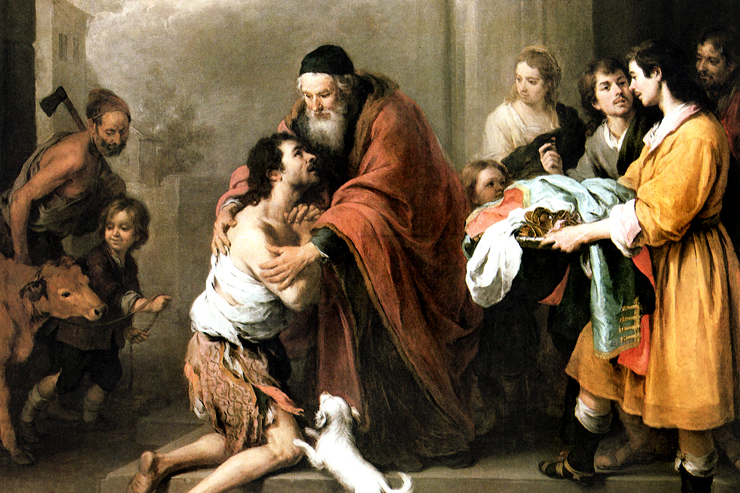
The Way of the Cross
There is a section of Luke’s Gospel known as the Travel Narrative. In this section, Jesus and his disciples journey together to Jerusalem for the last time where redemption will be won and the Church will be born. St. Luke takes nearly ten chapters (9:51-19:27) to record this journey to Jerusalem.
Along the way, Jesus prepares his disciples for the work to which he has called them. Some of the bible’s most cherished passages are found in this section, including:
- Lessons on prayer—we are given the Our Father and parables the convey that prayer should be urgent, persistent, faithful and expectant.
- Lessons on God’s mercy and our need to be merciful—we learn about the Good Samaritan and who is our neighbor. Within Luke’s Gospel of Mercy is the Chapter (15) of Mercy and its parables on the Lost Sheep, Lost Coin and Prodigal Son.
- Lessons on God’s Kingdom—we are told not to be afraid, that God is our true treasure and it is the Father’s good pleasure to give to us the Kingdom.
These lessons of discipleship that offer each of us practical help for living the faith day in and day out. You may already be very familiar with them, yet still ask yourself at times, “Why am I not a more faithful disciple? Why is my prayer life so poor and my attention to God’s will so lacking?”
To get us started on the right foot, St. Luke packs important principles of discipleship in the opening eleven verses of this travel narrative that might help boost and strengthen your life of faith. Let’s look at five key lessons.
Five Lessons for Faithful Discipleship
1. Be resolute and intentional in your commitment to Jesus.
“When the days for Jesus’ being taken up were fulfilled, he resolutely determined to journey to Jerusalem, and he sent messengers ahead of him” (Luke 9:51-52).
How many times do we experience what we might call false starts? Maybe it seems you have even spent a life-time of making false starts. We mean well. We mean to do what we say. But, somehow we always find ourselves needing to start over. Has this ever happened to you? It sure has to me.
So what is wrong?
First, let’s be sure to distinguish between the sins and faults we are certain to commit and a more serious failure to even begin. We will fail at times. There will be bumps and bruises along the way. But remember, Jesus has made it possible for us to live the lives God has prepared for us. God’s grace conveyed through the sacraments, the practice of the human virtues and a commitment to prayer and service will help us persevere. Our ongoing conversion will proceed through an end to grave sin, an end to even venial sin, and even on to a life of heroic virtue.
But, be sure that you have truly begun. Have you intentionally and completely surrendered your life to Christ?
Jesus began his journey to Jerusalem with deliberate resolution… he “turned” towards Jerusalem. Some translations read that He “set his face” towards Jerusalem. Jesus had no need for conversion, but we do. While conversion is a life-long endeavor, we must begin. We need to deliberately and resolutely “turn” away from sin and towards God, away from our prior life and take up the new life in Christ.
2. In all things be humble and charitable, especially in zealotry.
“On the way they entered a Samaritan village to prepare for his reception there, but they would not welcome him because the destination of his journey was Jerusalem. When the disciples James and John saw this they asked, ‘Lord, do you want us to call down fire from heaven to consume them?’ Jesus turned and rebuked them, and they journeyed to another village” (Luke 9:52-55).
Not everyone will approve of and be accepting of your commitment to Jesus. Some will ridicule you, some will politely ignore you and some will resent you. How is the disciple to respond?
The Apostles James and John asked to strike down the Samaritans with fire from Heaven! Have you ever felt that way? Okay, maybe not that extreme, but it is not unusual for a parent’s disappointment with their children’s or sibling’s decisions about the faith to become so personal that the relationship is strained to the breaking point. We must admit that there are times when Christians, maybe even ourselves, have actually struck out in hatred and vengeance against those who have rejected the faith.
Jesus teaches that we are to be patient with those who do not share in our beliefs or the depths of our passion. Pray for them, be an example for them, but let go and move on to others who God may be placing in our lives. Our only enemy is the devil and his minions. Christ died for everyone else and we are to love them as he loves them. Jesus came to Earth to save people, not to destroy them.
3. Disciples must be willing to lose everything for the Lord.
“As they were proceeding on their journey someone said to him, ‘I will follow you wherever you go.’ Jesus answered him, ‘Foxes have dens and birds of the sky have nests, but the Son of Man has nowhere to rest his head’” (Luke 9:57-58).
Our resolute decision to surrender to Jesus must recognize that there may be a material cost. Are we prepared to accept this? We must live our faith throughout all aspects of our lives, including our careers. Are we prepared to risk our livelihood to avoid sin? Are we prepared to suffer discrimination in the workplace and marketplace because of our beliefs?
We may even be shunned by family and friends.
For our spiritual lives to progress, we must be willing to lose everything for the Lord.
4. The demand of discipleship outweighs all other priorities. Starting cannot be delayed. Nothing and no one is more important.
“And to another he said, ‘Follow me.’ But he replied, ‘(Lord,) let me go first and bury my father.’ But he answered him, ‘Let the dead bury their dead. But you, go and proclaim the kingdom of God’” (Luke 9:59-60).
By this example, Jesus drives home the supreme importance of becoming a disciple. Nothing in this life is more important. This is not to say that we neglect the responsibilities of our particular state in life. But, anything that obstructs our commitment to Christ must be set aside and left behind.
5. Discipleship requires that we let go of the past and live in the present according to the Will of God. Integrate, don’t compartmentalize.
“And another said, ‘I will follow you, Lord, but first let me say farewell to my family at home.’ (To him) Jesus said, ‘No one who sets a hand to the plow and looks to what was left behind is fit for the kingdom of God’” (Luke 9:59-62).
And so to elaborate on the fourth lesson, we need to continually ask if the concerns of the world hold us back from growing in the life of faith? Putting off prayer until you are not so busy… neglecting the spiritual education and formation of your children because everyone is just so busy… ignoring your desire to help those in need until you have more time and money… these are easy habits to fall into and reflect a holding onto the old way of life before Christ. When we commit to Christ, we need to give him our best efforts and our prime time, not just what is left over after a hard day’s work.
The key is not to ignore life’s demands, but simply to integrate them into your life of faith. That is why Jesus teaches that we are to seek the Kingdom first and then all else will be provided (cf. Luke 12:31). The present culture would have us believe that the practice of faith should remain within these four walls of the church building, but that is a tragic error. True discipleship is to go forth from Holy Mass, renewed and strengthened, into the world and allow Jesus to transform the culture through our lives.
Let us so pray each day.
Into the deep…
Deacon Bickerstaff is available to speak at your parish or event. Be sure to check out his Speaker Page to learn more. Into the Deep is a regular feature of the The Integrated Catholic Life™.
Come and Join me on Twitter!















